‘Change begins at the end
of your comfort zone’
The Intergovernmental Panel on Climate Change (IPCC) Special Report ‘Global Warming of 1.5°C’ (2018) is clear on the causes and effects of climate change
on the world. The report states that the primary driver of long term global warming is carbon dioxide emissions (CO2) and that global temperatures relate
to increased cumulative CO2 emissions from human activity, primarily from energy use. This will result in significant loss of ecosystems and biodiversity
along with increased impacts on human health and the economy. The world is already around 1°C warmer than pre-industrial times and is currently on
track to reach between 3-4°C global temperature increase by 2100 if no action is taken.
The United Nations Framework Convention on Climate Change (UNFCC) Paris Agreement (2015), to which the UK is a signatory, aims to:
“Strengthen the global response to the threat of climate change by keeping a global temperature rise this century well below 2°C above pre-industrial levels
and to pursue efforts to limit the temperature increase even further to 1.5°C.”
The UK will deliver on the Paris Agreement by vigorously pursuing a target to reduce greenhouse gas (GHG) emissions to ‘net zero’ by 2050, ending the UK’s
contribution to global warming within 31 years. This was enshrined in law in June 2019 through amendments to the 2050 GHG emissions reduction target
in the Climate Change Act 2008 from at least 80% to at least 100%, otherwise known as ‘net zero’.
TMS
remains
committed
to
putting
the
principles
of
sustainable
development
into
action
in
everything
it
does.
This
is
so
that
development
meets
the
needs
of
today
without
compromising
the
ability of future generations to meet their own.
TMS
is
increasingly
determined
to
have
a
positive
effect
on
the
environment
and
to
avoid
any
unintended
consequences
through
its
actions.
TMS
has
revised
its
corporate
Environment
Policy
to
strengthen
its
environmental
commitments,
ensuring
we
continue
to reduce the impact upon climate change.
TMS
has
now
set
new
environment
and
climate
change
targets
for
the
future.
TMS
will
lead
the
way
on
tackling
greenhouse
gas
emissions by:
•
Working
with
partners,
businesses
and
communities
to
tackle
climate change through a common framework.
•
Reducing
the
emissions
from
its
own
estate
and
operations
to
net zero by 2050.
TMS is committed to achieving Net Zero emissions by 2050.
TMS is increasingly determined to have a positive effect on the
environment and to avoid any unintended consequences
through its actions. TMS has revised its corporate Environment
Policy to strengthen its environmental commitments to reduce
the TMS impact on climate change.
Net zero - the challenge changing the Carbon footprint
Copyright © 2025 TMS Support Solutions Ltd. All rights reserved



We
comply
with
the
following
standards
which
ensures
that
we
deliver
you
the
highest
possible
standards
of
service:
ISO
9001:2015,
ISO
14001,
DTCT,
Cyber
Essentials
Plus.
Our
ISO
accreditations
cover
the
production
and
Project
Management
of
the
following
services:
Integrated
Logistic
Support
(ILS)
solutions,
Technical
Documentation,
Training
(Analysis,
Design
and
Delivery),
Safety
and
Environmental
Services,
Graphic
Design,
Electronic
data
management
solutions,
Bid Preparation, Translation services, Engineering support.
Accreditations and Standards
contacts
careers
Services



‘Change begins at the end
of your comfort zone’
Chart 2 - Annual Emission Totals (Tonnes)
The Intergovernmental Panel on Climate Change
(IPCC) Special Report ‘Global Warming of 1.5°C’ (2018)
is clear on the causes and effects of climate change
on the world. The report states that the primary
driver of long term global warming is carbon dioxide
emissions (CO2) and that global temperatures relate
to increased cumulative CO2 emissions from human
activity, primarily from energy use. This will result in
significant loss of ecosystems and biodiversity along
with increased impacts on human health and the
economy. The world is already around 1°C warmer
than pre-industrial times and is currently on track to
reach between 3-4°C global temperature increase by
2100 if no action is taken.
The United Nations Framework Convention on
Climate Change (UNFCC) Paris Agreement (2015), to
which the UK is a signatory, aims to:
“Strengthen the global response to the threat of
climate change by keeping a global temperature rise
this century well below 2°C above pre-industrial levels
and to pursue efforts to limit the temperature
increase even further to 1.5°C.”
The UK will deliver on the Paris Agreement by
vigorously pursuing a target to reduce greenhouse
gas (GHG) emissions to ‘net zero’ by 2050, ending the
UK’s contribution to global warming within 31 years.
This was enshrined in law in June 2019 through
amendments to the 2050 GHG emissions reduction
target in the Climate Change Act 2008 from at least
80% to at least 100%, otherwise known as ‘net zero’.
TMS
remains
committed
to
putting
the
principles
of
sustainable
development
into
action
in
everything
it
does.
This
is
so
that
development
meets
the
needs
of
today
without
compromising
the
ability
of
future
generations to meet their own.
TMS
is
increasingly
determined
to
have
a
positive
effect
on
the
environment
and
to
avoid
any
unintended
consequences
through
its
actions.
TMS
has
revised
its
corporate
Environment
Policy
to
strengthen
its
environmental
commitments,
ensuring
we
continue
to
reduce
the
impact
upon
climate
change.
TMS
has
now
set
new
environment
and
climate
change
targets
for
the
future.
TMS
will
lead
the
way
on tackling greenhouse gas emissions by:
•
Working
with
partners,
businesses
and
communities
to
tackle
climate
change
through
a
common framework.
•
Reducing
the
emissions
from
its
own
estate
and
operations to
net zero by 2050.
TMS Progress Summary
Net zero - the challenge changing the Carbon footprint
TMS is committed to achieving Net Zero
emissions by 2050.
Copyright © 2024 TMS Support Solutions Ltd. All rights reserved



We
comply
with
the
following
standards
which
ensures
that
we
deliver
you
the
highest
possible
standards
of
service:
ISO
9001:2015,
ISO
14001,
DTCT,
Cyber
Essentials
Plus.
Our
ISO
accreditations
cover
the
production
and
Project
Management
of
the
following
services:
Integrated
Logistic
Support
(ILS)
solutions,
Technical
Documentation,
Training
(Analysis,
Design
and
Delivery),
Safety
and
Environmental
Services,
Graphic
Design,
Electronic
data
management
solutions,
Bid Preparation, Translation services, Engineering support.
Accreditations and Standards
contacts
careers
Services













